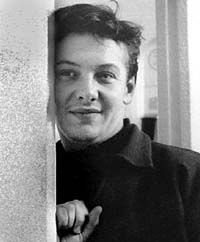The International Federation of Journalists presented the book Dying to Tell a Story in Brussels, commemorating journalists killed in the line of duty, among them the Ukrainian Reuters cameraman Taras Protsiuk. The book is meant to remind the world that the journalists need a better protection.
In fact, the book has a separate chapter dedicated to Taras Protsiuk. Duncan Pitcairn, Reuters Deputy TV News Director for Europe, Middle East, and Africa, tells the story about Protsiuk’s life and work, stressing that he was a courageous but not reckless observer of hostilities, that he was very sociable, had covered most conflicts of the past decade, but one would never know any of this meeting him for the first time. Taras’s other Reuters colleague in Moscow adds that one would never guess all the tragedies his smiling eyes had seen.
Australian Duncan Pitcairn also tells about Protsiuk’s youth and work. The collapse of the Soviet Union and its space program left Taras a slim chance to find a job in line with his qualification as an aeronautics engineer, but he knew six languages, including Arabic which he had learned while living in Syria where his father had worked for two years. Taras earned a living translating foreign newspaper and magazine articles and then working as an assistant audio engineer. Then he became a cameraman. He was prepared to cover any conflict, anywhere on the post-Soviet expanse. For ten years he shot natural cataclysms, conflicts, and outbursts of public unrest in former Soviet republics, Yugoslavia, Afghanistan, Pakistan, and in the Middle East. Duncan Pitcairn writes that, while shooting an earthquake in the Far East, he spent ten hours transmitting his video report. After the report was broadcast, showing the world Russia’s second hardest quake, the Ukrainian cameraman asked the Reuters office only one favor: Could they send him his parka and other winter clothes, as he had to work at -10 o C, wearing a T- shirt and a pair of jeans (he had been sent there on short notice and had had no time to pack).
It transpired that he not only shot the rescue teams at work, but also took part in rescue operations himself. He would keep his camera running for five minutes, then put it aside and join the rescue team. He would train his camera on wounded people and then turn it off and give the wounded first aid, making IV injections onboard a helicopter transporting the wounded to a hospital, and would help such transportation.
During the Kosovo War, Protsiuk spent three days in jail in Belgrade, arrested for entering Serbia without a visa. He remained unperturbed, except that he could not help laughing, remembering that the name of the official who put him behind bars was Milosevic.
Protsiuk remained true to his duty, showing his audiences the truth at all costs. In fact, this principled approach almost cost him his job in 1999 when he ignored instructions from Moscow to stay on the Russian side of the border with Chechnya until the cease-fire. Together with a local Chechen, he set off to a Grozny suburb where he shot the first scenes of the Chechen capital being destroyed by Russian troops.
He died quickly. He was on a balcony, on the fifteenth floor of the Palestine Hotel, where most journalists were accommodated. The war was almost over, he had lived through the air raids, and the US forces were already in Baghdad. In the morning he shot with his camera US tanks moving toward the city center on the opposite bank of the river facing the hotel. He was relaxed, discussing going home with his French cameraman friend Paul Pascal when a shell from the US tank he had shot only minutes before hit the side of the hotel with the balcony. Paul was gravely wounded in the legs, arms, and head, along with two other journalists in the room. Taras was hit in the chest and stomach. He was unconscious when his colleagues carried him out of the hotel and died on the back seat of the car racing him to the hospital. Spanish cameraman Jose Couso, shooting his camera from a balcony on a floor below, died later. Such are the heretofore unknown details of Protsiuk’s death. Duncan Pitcairn bitterly states that cameramen on friendly terms with each other visit each other’s weddings, but increasingly often they also attend their friends’ funerals.







